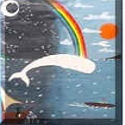
Pre-reading is like getting a firm foothold in the starting block before a tough race.
Prereading is not required, of course. Many have read Moby without foreknowledge of any aspects of the novel, but having some basic information encourages a smooth beginning and facilitates comprehension.
Remember, your goal is to finish the novel. Knowing some basic information about the journey helps.

Allusions
An allusion is a brief and indirect reference to a person, place, thing or idea of historical, cultural, literary, or political significance. It does not describe in detail the person or thing to which it refers. Allusions may indicate foreshadowing or an attitude of the author.
Melville liberally uses allusions to add depth and breadth to his story and to communicate his attitude toward the ideas presented.
On your first reading of the novel, avoid the compulsion to know and understand every allusion. Get the ones you can and let the others go until a second reading.
Beginning with Chapter 1, links are provided to an Allusions list for quick reference. Use it as you wish.

Remember your goal:
Finish a first reading of the novel.
For prereading purposes, the following Biblical and historical allusions are helpful.
An allusion is a brief and indirect reference to a person, place, thing or idea of historical, cultural, literary, or political significance. It does not describe in detail the person or thing to which it refers. Allusions may indicate foreshadowing or an attitude of the author.
Melville liberally uses allusions to add depth and breadth to his story and to communicate his attitude toward the ideas presented.
On your first reading of the novel, avoid the compulsion to know and understand every allusion. Get the ones you can and let the others go until a second reading.
Beginning with Chapter 1, links are provided to an Allusions list for quick reference. Use it as you wish.

Finish a first reading of the novel.
For prereading purposes, the following Biblical and historical allusions are helpful.

Biblical Allusions
Ishmael--This Biblical name is in the first sentence of the novel, and Ishmael, the main character, tells his story in first person. "Ishmael" means "God will hear." The Biblical Ishmael was the son of Abraham, sent into exile with his mother. After several years in exile, an angel appeared before his mother, telling her to return to Abraham.
Ahab--a king of Israel who acted contrary to God's laws and suffered the consequences. See more detail under "Elijah," below.
Elijah--a great prophet. His part in Moby Dick relates to Ahab. Ahab provoked the anger of the Lord. His wife, Jezebel, who was a worshiper of Baal, persuaded him to build an altar to the false god.
Elijah, a prophet of the Lord, was sent to Ahab and proposed a test. Two altars were built: one to Jehovah and one to Baal. The priests of Baal called upon their god to send down fire, but there was no answer. Then Elijah called upon the Lord God of Abraham, Isaac and Israel, and fire came down and burnt up the offering. The people turned upon the priests of Baal and killed them all.
Later, Ahab coveted a vineyard owned by Naboth, offered to buy it from him, but Naboth would not sell it. Jezebel arranged for false witnesses to charge Naboth with blasphemy. He was stoned to death. Ahab took the vineyard.
Once more Elijah came and denounced Ahab and Jezebel and described to them the Lord's punishments for their wickedness. Read the details in 1 Kings 21:1-29 (Bible).
Elijah later was taken up to heaven in a chariot of fire.
Ishmael--This Biblical name is in the first sentence of the novel, and Ishmael, the main character, tells his story in first person. "Ishmael" means "God will hear." The Biblical Ishmael was the son of Abraham, sent into exile with his mother. After several years in exile, an angel appeared before his mother, telling her to return to Abraham.
Ahab--a king of Israel who acted contrary to God's laws and suffered the consequences. See more detail under "Elijah," below.
Elijah--a great prophet. His part in Moby Dick relates to Ahab. Ahab provoked the anger of the Lord. His wife, Jezebel, who was a worshiper of Baal, persuaded him to build an altar to the false god.
Elijah, a prophet of the Lord, was sent to Ahab and proposed a test. Two altars were built: one to Jehovah and one to Baal. The priests of Baal called upon their god to send down fire, but there was no answer. Then Elijah called upon the Lord God of Abraham, Isaac and Israel, and fire came down and burnt up the offering. The people turned upon the priests of Baal and killed them all.
Later, Ahab coveted a vineyard owned by Naboth, offered to buy it from him, but Naboth would not sell it. Jezebel arranged for false witnesses to charge Naboth with blasphemy. He was stoned to death. Ahab took the vineyard.
Once more Elijah came and denounced Ahab and Jezebel and described to them the Lord's punishments for their wickedness. Read the details in 1 Kings 21:1-29 (Bible).
Elijah later was taken up to heaven in a chariot of fire.

Historical Allusions
The Puritan Attack on Fort Pequot
Read this original report by John Mason describing the Puritans' attack on an American Indian tribe, the Pequots, in 1636.
The whaling ship, Pequod, is named after the Pequot tribe.
Origin of the Name "Moby Dick"
Melville drew from personal experience and knowledge, history, and contemporary news accounts to tell his tale. Read this article explaining how Melville may have arrived at the name, Moby Dick.
The Puritan Attack on Fort Pequot
Read this original report by John Mason describing the Puritans' attack on an American Indian tribe, the Pequots, in 1636.
The whaling ship, Pequod, is named after the Pequot tribe.
Origin of the Name "Moby Dick"
Melville drew from personal experience and knowledge, history, and contemporary news accounts to tell his tale. Read this article explaining how Melville may have arrived at the name, Moby Dick.

Preread: Video
The True Sory of Moby Dick, a Discovery channel film
This film (46 minutes) gives no interpretive insight into the novel, Moby Dick. However, it shows the importance of the whale industry, the living conditions aboard a whaling ship, and the fate of the whale ship, Essex.
The loss of the Essex was investigated by the maritime board and well publicised. Melville used the true account, written by the first mate, as the springboard for his epic novel.

Biography: Herman Melville
You need not read about the author before reading the novel. Moby stands on its own. However, some readers prefer to know about the author before reading.
An excellent biographical article is available here.
You are ready to READ....